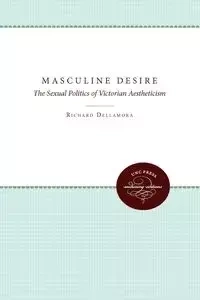Masculine Desire - Richard Dellamora
Masculine Desire - Richard Dellamora
- The Sexual Politics of Victorian Aestheticism
AutorzyRichard Dellamora
Central to the struggle over the meaning of masculine desire was the institutional politics of Oxford University, where Benjamin Jowett, Matthew Arnold, John Ruskin, and Walter Pater were principal players. As a young man in the 1860s, Pater, the art historian, essayist, and novelist, theorized a place for desire between men in cultural formation and critique. Later, in a climate of growing intolerance, he continued to affirm male-male desire but with increasing attention to the social functions of homophobia. Dellamora shows that discontent with conventional gender roles animated efforts to reimagine the possibilities of masculine existence.
Originally published in 1990.
A UNC Press Enduring Edition -- UNC Press Enduring Editions use the latest in digital technology to make available again books from our distinguished backlist that were previously out of print. These editions are published unaltered from the original, and are presented in affordable paperback formats, bringing readers both historical and cultural value.
EAN: 9780807842676
Symbol
364GGQ03527KS
Rok wydania
1990
Elementy
290
Oprawa
Miekka
Format
15.2x22.9cm
Język
angielski

Bez ryzyka
14 dni na łatwy zwrot

Szeroki asortyment
ponad milion pozycji

Niskie ceny i rabaty
nawet do 50% każdego dnia
Niepotwierdzona zakupem
Ocena: /5
Symbol
364GGQ03527KS
Kod producenta
9780807842676
Rok wydania
1990
Elementy
290
Oprawa
Miekka
Format
15.2x22.9cm
Język
angielski
Autorzy
Richard Dellamora

Beginning with Tennyson's In Memoriam and continuing by way of Hopkins and Swinburne to the novels of Oscar Wilde and Thomas Hardy, Richard Dellamora draws on journals, letters, censored texts, and pornography to examine the cultural construction of masculinity in Victorian literature.
Central to the struggle over the meaning of masculine desire was the institutional politics of Oxford University, where Benjamin Jowett, Matthew Arnold, John Ruskin, and Walter Pater were principal players. As a young man in the 1860s, Pater, the art historian, essayist, and novelist, theorized a place for desire between men in cultural formation and critique. Later, in a climate of growing intolerance, he continued to affirm male-male desire but with increasing attention to the social functions of homophobia. Dellamora shows that discontent with conventional gender roles animated efforts to reimagine the possibilities of masculine existence.
Originally published in 1990.
A UNC Press Enduring Edition -- UNC Press Enduring Editions use the latest in digital technology to make available again books from our distinguished backlist that were previously out of print. These editions are published unaltered from the original, and are presented in affordable paperback formats, bringing readers both historical and cultural value.
EAN: 9780807842676
Central to the struggle over the meaning of masculine desire was the institutional politics of Oxford University, where Benjamin Jowett, Matthew Arnold, John Ruskin, and Walter Pater were principal players. As a young man in the 1860s, Pater, the art historian, essayist, and novelist, theorized a place for desire between men in cultural formation and critique. Later, in a climate of growing intolerance, he continued to affirm male-male desire but with increasing attention to the social functions of homophobia. Dellamora shows that discontent with conventional gender roles animated efforts to reimagine the possibilities of masculine existence.
Originally published in 1990.
A UNC Press Enduring Edition -- UNC Press Enduring Editions use the latest in digital technology to make available again books from our distinguished backlist that were previously out of print. These editions are published unaltered from the original, and are presented in affordable paperback formats, bringing readers both historical and cultural value.
EAN: 9780807842676
Niepotwierdzona zakupem
Ocena: /5
Zapytaj o produkt
Niepotwierdzona zakupem
Ocena: /5
Napisz swoją opinię

